The Cambridge History of China. Vol. 13: Republican China 1912-1949, Part 2
Подождите немного. Документ загружается.

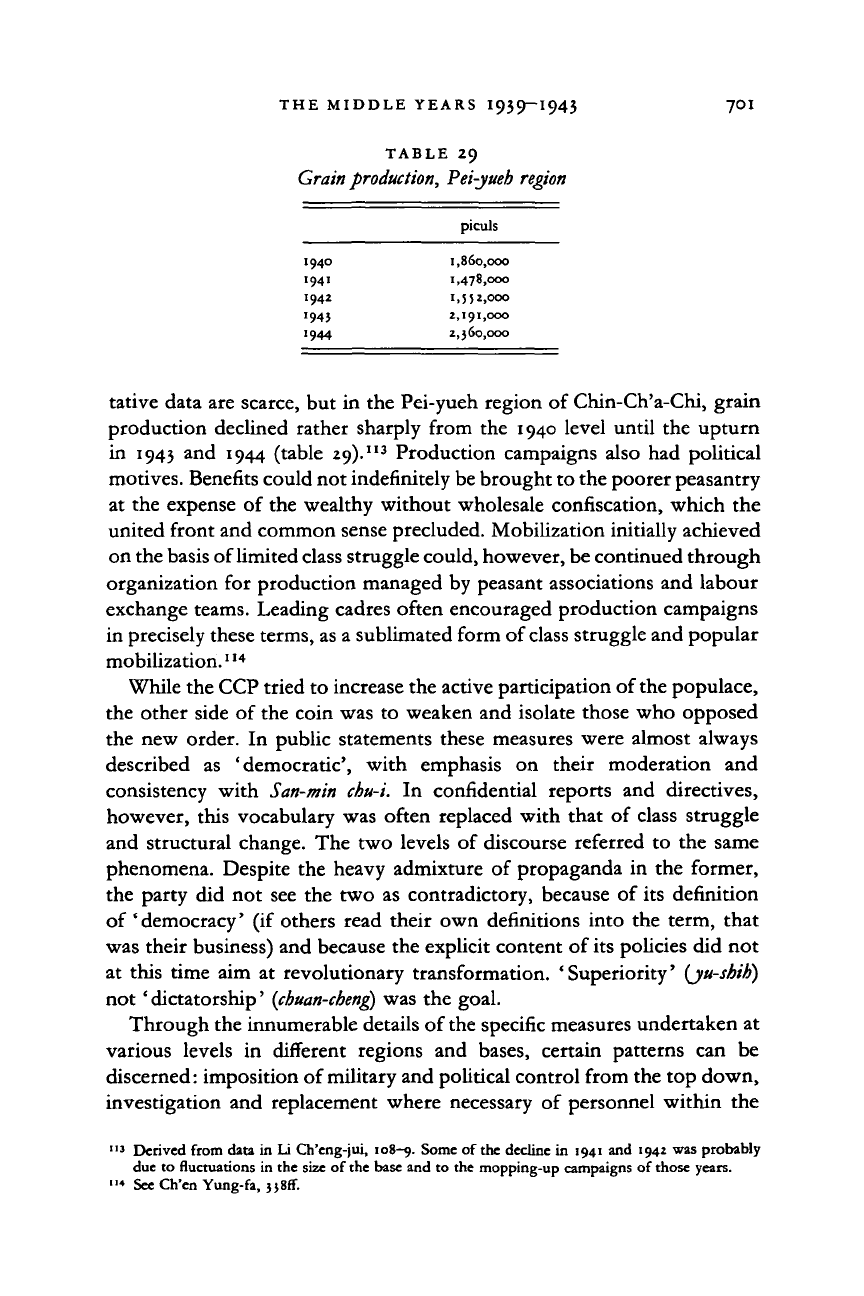
THE MIDDLE YEARS 1939-1943 7OI
TABLE 29
Grain
production,
Pei-jueb
region
1940
1941
1942
•943
1944
piculs
1,860,000
1,478,000
1,552,000
2,191,000
2,360,000
tative data are scarce, but in the Pei-yueh region of Chin-Ch'a-Chi, grain
production declined rather sharply from the 1940 level until the upturn
in 1943 and 1944 (table
29).
"
3
Production campaigns also had political
motives. Benefits could not indefinitely be brought to the poorer peasantry
at the expense of the wealthy without wholesale confiscation, which the
united front and common sense precluded. Mobilization initially achieved
on the basis of limited class struggle could, however, be continued through
organization for production managed by peasant associations and labour
exchange teams. Leading cadres often encouraged production campaigns
in precisely these terms, as a sublimated form of
class
struggle and popular
mobilization.
114
While the CCP tried to increase the active participation of the populace,
the other side of the coin was to weaken and isolate those who opposed
the new order. In public statements these measures were almost always
described as 'democratic', with emphasis on their moderation and
consistency with San-min
chu-i.
In confidential reports and directives,
however, this vocabulary was often replaced with that of class struggle
and structural change. The two levels of discourse referred to the same
phenomena. Despite the heavy admixture of propaganda in the former,
the party did not see the two as contradictory, because of its definition
of ' democracy' (if others read their own definitions into the term, that
was their business) and because the explicit content of its policies did not
at this time aim at revolutionary transformation. 'Superiority' (ju-shih)
not 'dictatorship'
(chuan-cheng)
was the goal.
Through the innumerable details of the specific measures undertaken at
various levels in different regions and bases, certain patterns can be
discerned: imposition of military and political control from the top down,
investigation and replacement where necessary of personnel within the
113
Derived from data in Li Ch'eng-jui, 108-9. Some of the decline in 1941 and 1942 was probably
due to fluctuations in the size of the base and to the mopping-up campaigns of those years.
"* See Ch'en Yung-fa,
3}8ff.
Cambridge Histories Online © Cambridge University Press, 2008
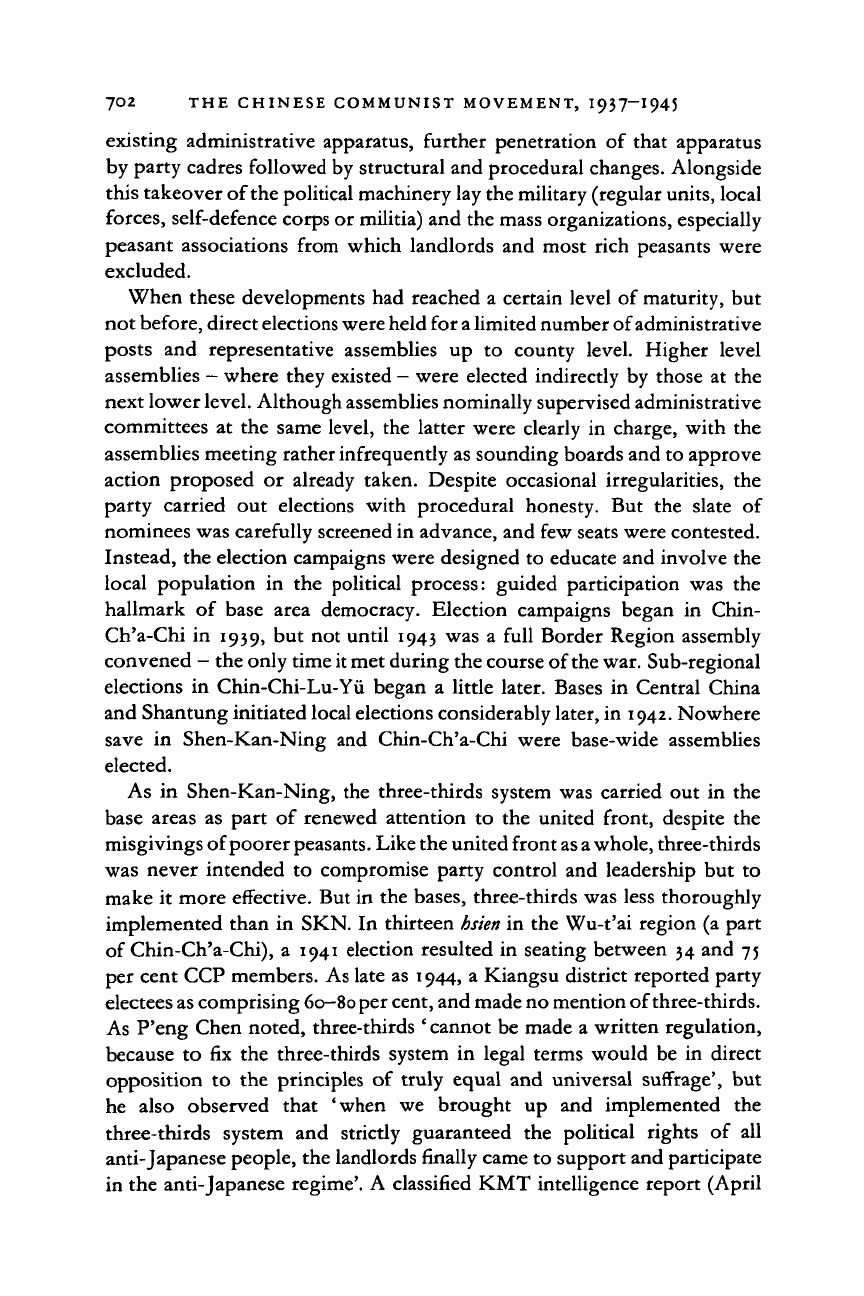
7O2 THE CHINESE COMMUNIST MOVEMENT, I937-I945
existing administrative apparatus, further penetration of that apparatus
by party cadres followed by structural and procedural changes. Alongside
this takeover of the political machinery lay the military (regular units, local
forces, self-defence corps or militia) and the mass organizations, especially
peasant associations from which landlords and most rich peasants were
excluded.
When these developments had reached a certain level of maturity, but
not before, direct elections were held for
a
limited number of administrative
posts and representative assemblies up to county level. Higher level
assemblies - where they existed - were elected indirectly by those at the
next lower
level.
Although assemblies nominally supervised administrative
committees at the same level, the latter were clearly in charge, with the
assemblies meeting rather infrequently as sounding boards and to approve
action proposed or already taken. Despite occasional irregularities, the
party carried out elections with procedural honesty. But the slate of
nominees was carefully screened in advance, and few seats were contested.
Instead, the election campaigns were designed to educate and involve the
local population in the political process: guided participation was the
hallmark of base area democracy. Election campaigns began in Chin-
Ch'a-Chi in 1939, but not until 1943 was a full Border Region assembly
convened - the only time it met during the course of the war. Sub-regional
elections in Chin-Chi-Lu-Yu began a little later. Bases in Central China
and Shantung initiated local elections considerably later, in 1942. Nowhere
save in Shen-Kan-Ning and Chin-Ch'a-Chi were base-wide assemblies
elected.
As in Shen-Kan-Ning, the three-thirds system was carried out in the
base areas as part of renewed attention to the united front, despite the
misgivings of poorer
peasants.
Like the united front
as a
whole,
three-thirds
was never intended to compromise party control and leadership but to
make it more effective. But in the bases, three-thirds was less thoroughly
implemented than in SKN. In thirteen
hsien
in the Wu-t'ai region (a part
of Chin-Ch'a-Chi), a 1941 election resulted in seating between 34 and 75
per cent CCP members. As late as 1944, a Kiangsu district reported party
electees as comprising 60-80 per cent, and made no mention of three-thirds.
As P'eng Chen noted, three-thirds ' cannot be made a written regulation,
because to fix the three-thirds system in legal terms would be in direct
opposition to the principles of truly equal and universal suffrage', but
he also observed that 'when we brought up and implemented the
three-thirds system and strictly guaranteed the political rights of all
anti-Japanese people, the landlords finally came to support and participate
in the anti-Japanese regime'. A classified KMT intelligence report (April
Cambridge Histories Online © Cambridge University Press, 2008
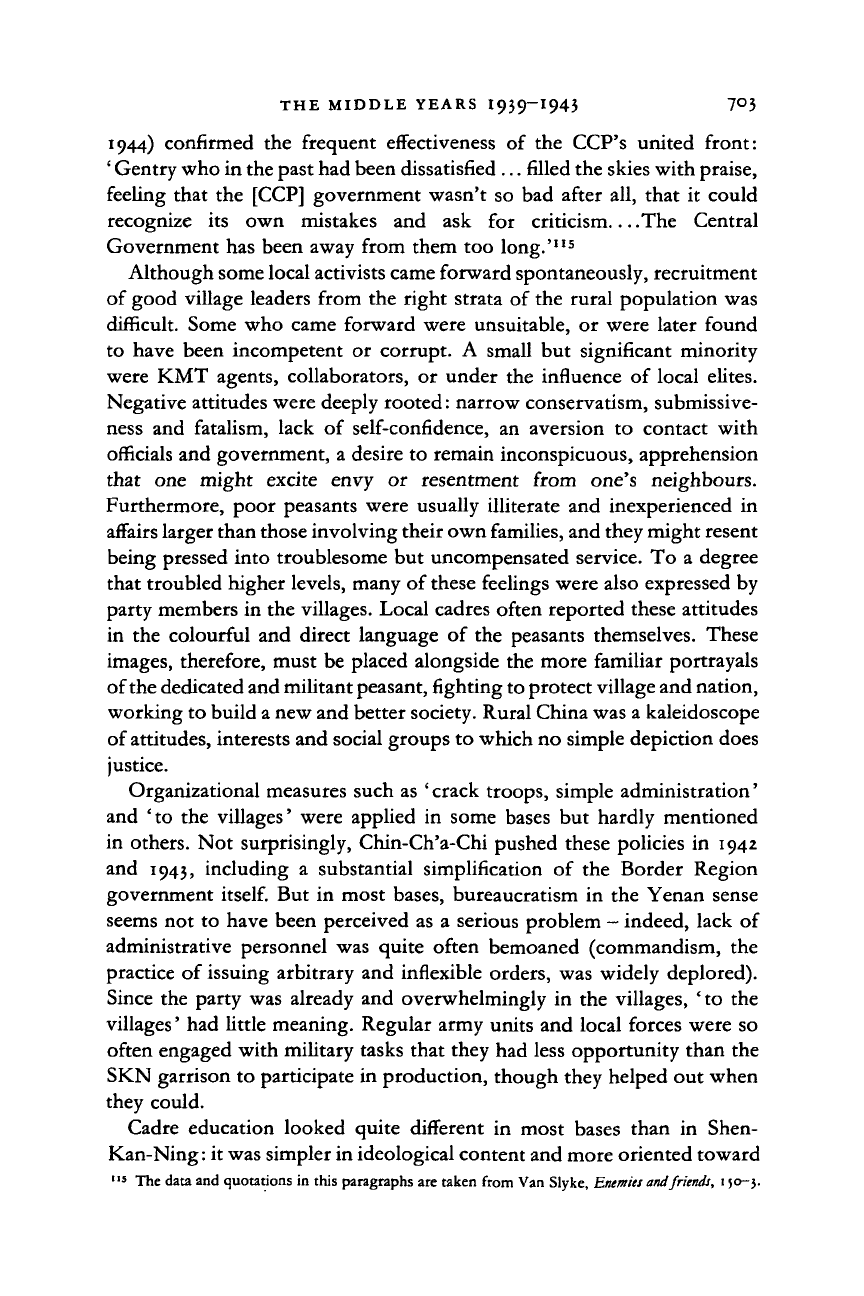
THE MIDDLE YEARS I939-I943 703
1944) confirmed the frequent effectiveness
of
the CCP's united front:
' Gentry who in the past had been dissatisfied ... filled the skies with praise,
feeling that the [CCP] government wasn't so bad after all, that
it
could
recognize
its own
mistakes
and ask for
criticism
The
Central
Government has been away from them too long.'
115
Although some local activists came forward spontaneously, recruitment
of good village leaders from the right strata of the rural population was
difficult. Some who came forward were unsuitable,
or
were later found
to have been incompetent
or
corrupt.
A
small but significant minority
were KMT agents, collaborators,
or
under the influence
of
local elites.
Negative attitudes were deeply rooted: narrow conservatism, submissive-
ness and fatalism, lack
of
self-confidence,
an
aversion
to
contact with
officials and government, a desire to remain inconspicuous, apprehension
that
one
might excite envy
or
resentment from one's neighbours.
Furthermore, poor peasants were usually illiterate and inexperienced
in
affairs larger than those involving their own families, and they might resent
being pressed into troublesome but uncompensated service. To
a
degree
that troubled higher levels, many of these feelings were also expressed by
party members in the villages. Local cadres often reported these attitudes
in the colourful and direct language
of
the peasants themselves. These
images, therefore, must be placed alongside the more familiar portrayals
of the dedicated and militant peasant, fighting to protect village and nation,
working to build a new and better society. Rural China was a kaleidoscope
of
attitudes,
interests and social groups to which no simple depiction does
justice.
Organizational measures such as 'crack troops, simple administration'
and 'to the villages' were applied
in
some bases but hardly mentioned
in others. Not surprisingly, Chin-Ch'a-Chi pushed these policies
in
1942
and 1943, including
a
substantial simplification
of
the Border Region
government
itself.
But in most bases, bureaucratism
in
the Yenan sense
seems not to have been perceived as
a
serious problem
-
indeed, lack of
administrative personnel was quite often bemoaned (commandism, the
practice of issuing arbitrary and inflexible orders, was widely deplored).
Since the party was already and overwhelmingly
in
the villages, 'to the
villages' had little meaning. Regular army units and local forces were so
often engaged with military tasks that they had less opportunity than the
SKN garrison to participate in production, though they helped out when
they could.
Cadre education looked quite different
in
most bases than
in
Shen-
Kan-Ning: it was simpler in ideological content and more oriented toward
115
The data and quotations in this paragraphs are taken from Van Slyke,
Emmies
and friends, i )o-j.
Cambridge Histories Online © Cambridge University Press, 2008
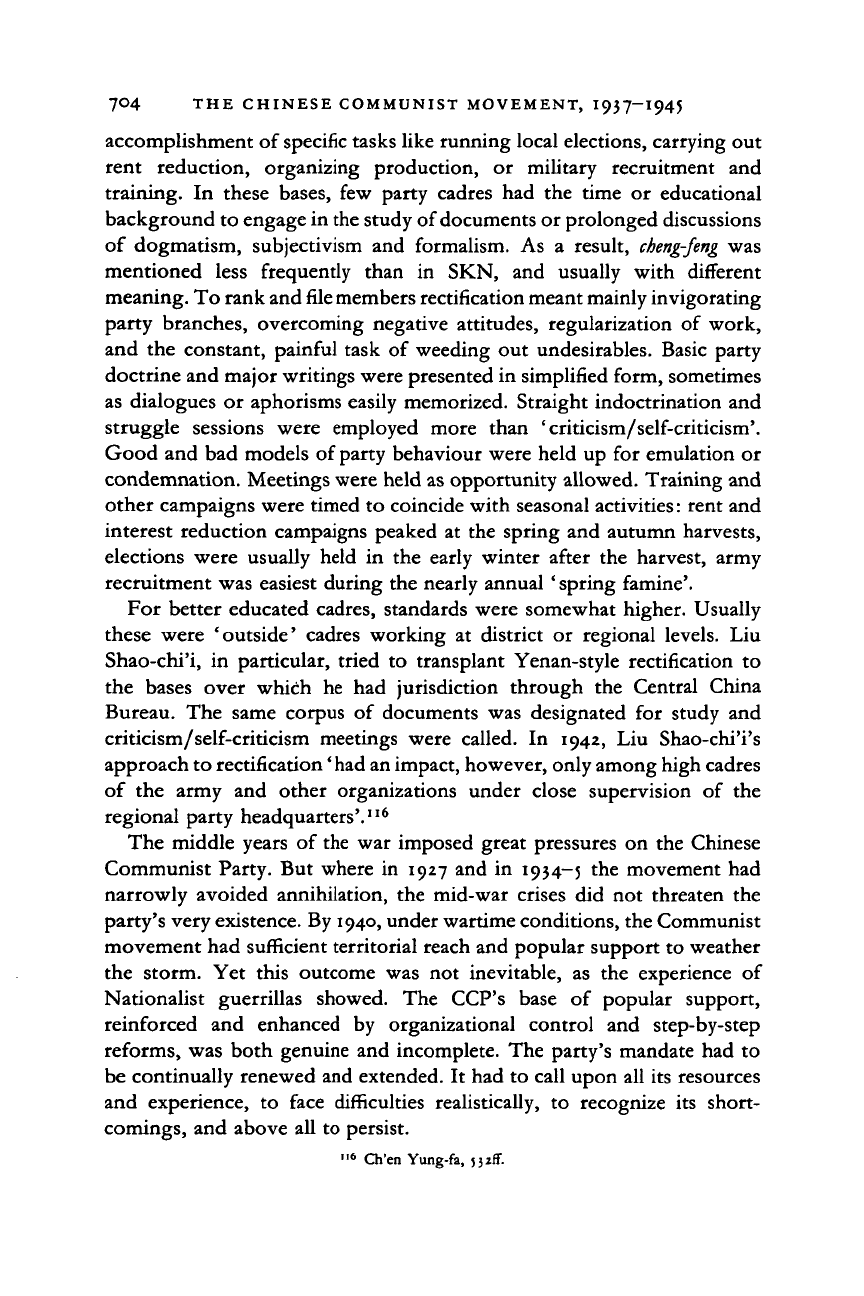
7°4 THE CHINESE COMMUNIST MOVEMENT, I937-1945
accomplishment of specific tasks like running local elections, carrying out
rent reduction, organizing production,
or
military recruitment
and
training.
In
these bases,
few
party cadres
had the
time
or
educational
background to engage in the study of documents or prolonged discussions
of dogmatism, subjectivism
and
formalism.
As a
result,
cheng-feng
was
mentioned less frequently than
in SKN, and
usually with different
meaning. To rank and
file
members rectification meant mainly invigorating
party branches, overcoming negative attitudes, regularization
of
work,
and the constant, painful task
of
weeding out undesirables. Basic party
doctrine and major writings were presented in simplified form, sometimes
as dialogues
or
aphorisms easily memorized. Straight indoctrination and
struggle sessions were employed more than 'criticism/self-criticism'.
Good and bad models of party behaviour were held up for emulation
or
condemnation. Meetings were held as opportunity allowed. Training and
other campaigns were timed to coincide with seasonal activities: rent and
interest reduction campaigns peaked
at
the spring and autumn harvests,
elections were usually held
in
the early winter after
the
harvest, army
recruitment was easiest during the nearly annual 'spring famine'.
For better educated cadres, standards were somewhat higher. Usually
these were 'outside' cadres working
at
district
or
regional levels.
Liu
Shao-chi'i,
in
particular, tried
to
transplant Yenan-style rectification
to
the bases over which
he had
jurisdiction through
the
Central China
Bureau.
The
same corpus
of
documents was designated
for
study and
criticism/self-criticism meetings were called.
In
1942,
Liu
Shao-chi'i's
approach to rectification 'had an impact, however, only among high cadres
of
the
army
and
other organizations under close supervision
of the
regional party headquarters'.
116
The middle years
of
the war imposed great pressures
on
the Chinese
Communist Party. But where
in
1927 and
in
1934—5 the movement had
narrowly avoided annihilation,
the
mid-war crises
did not
threaten
the
party's very existence. By 1940, under wartime conditions, the Communist
movement had sufficient territorial reach and popular support to weather
the storm.
Yet
this outcome was
not
inevitable,
as the
experience
of
Nationalist guerrillas showed.
The
CCP's base
of
popular support,
reinforced
and
enhanced
by
organizational control
and
step-by-step
reforms, was both genuine and incomplete. The party's mandate had
to
be continually renewed and extended.
It
had to call upon all its resources
and experience,
to
face difficulties realistically,
to
recognize
its
short-
comings, and above all to persist.
116
Ch'en Yung-fa,
5 3
iff.
Cambridge Histories Online © Cambridge University Press, 2008
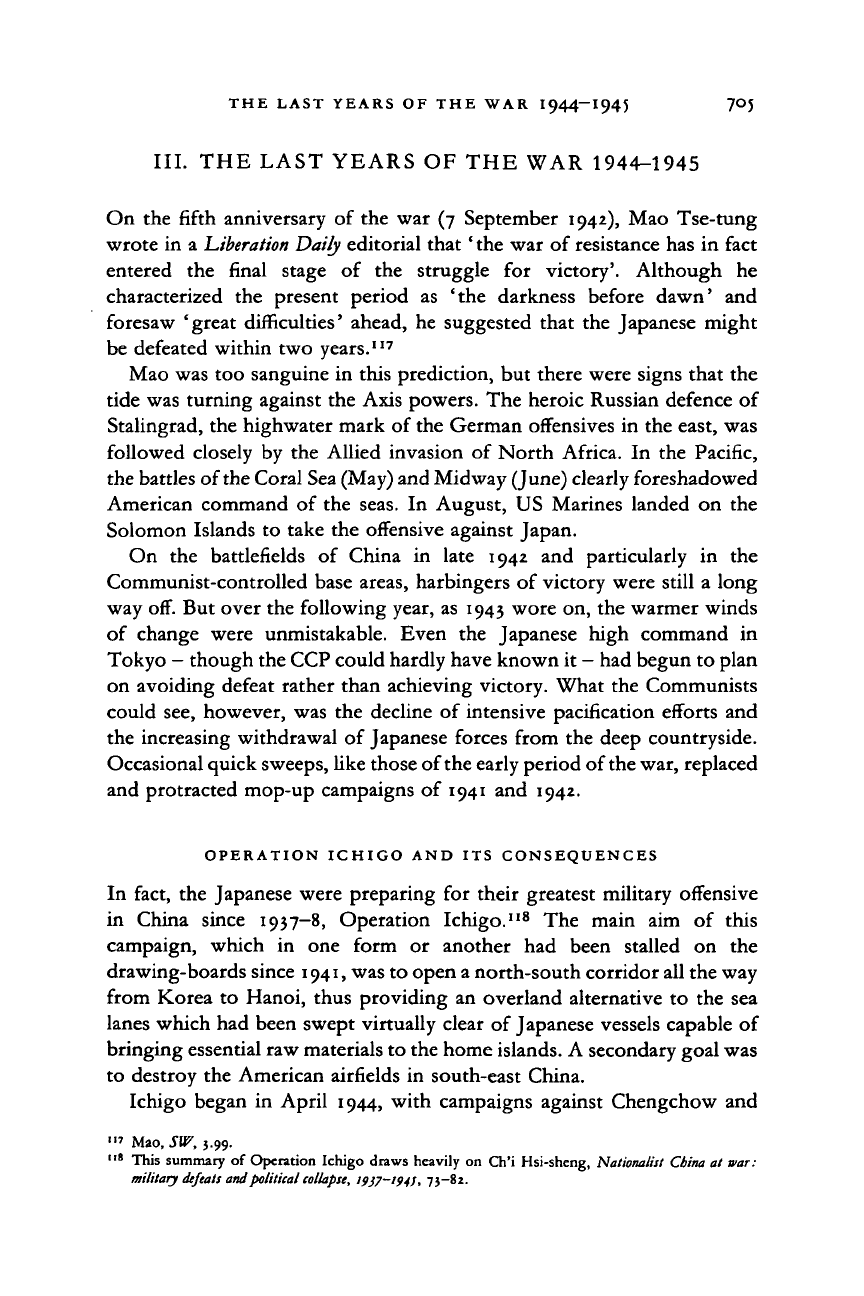
THE LAST YEARS OF THE WAR I944-I945 705
III.
THE LAST YEARS
OF
THE WAR 1944-1945
On the fifth anniversary
of
the war (7 September 1942), Mao Tse-tung
wrote in
a
Liberation
Daily editorial that'
the
war of resistance has in fact
entered
the
final stage
of the
struggle
for
victory'. Although
he
characterized
the
present period
as 'the
darkness before dawn'
and
foresaw 'great difficulties' ahead,
he
suggested that the Japanese might
be defeated within two years.
117
Mao was too sanguine in this prediction, but there were signs that the
tide was turning against the Axis powers. The heroic Russian defence of
Stalingrad, the highwater mark of the German offensives in the east, was
followed closely by the Allied invasion
of
North Africa.
In
the Pacific,
the battles of the Coral Sea (May) and Midway (June) clearly foreshadowed
American command
of
the seas.
In
August, US Marines landed
on the
Solomon Islands to take the offensive against Japan.
On
the
battlefields
of
China
in
late 1942
and
particularly
in the
Communist-controlled base areas, harbingers
of
victory were still
a
long
way off. But over the following year, as 1943 wore on, the warmer winds
of change were unmistakable. Even
the
Japanese high command
in
Tokyo
—
though the CCP could hardly have known it
—
had begun to plan
on avoiding defeat rather than achieving victory. What the Communists
could see, however, was the decline
of
intensive pacification efforts and
the increasing withdrawal
of
Japanese forces from the deep countryside.
Occasional quick sweeps, like those of the early period of the war, replaced
and protracted mop-up campaigns
of
1941 and 1942.
OPERATION ICHIGO AND ITS CONSEQUENCES
In fact, the Japanese were preparing
for
their greatest military offensive
in China since 1937-8, Operation Ichigo.
118
The
main
aim of
this
campaign, which
in one
form
or
another
had
been stalled
on the
drawing-boards since
1941,
was to open a north-south corridor all the way
from Korea
to
Hanoi, thus providing an overland alternative
to
the sea
lanes which had been swept virtually clear of Japanese vessels capable of
bringing essential raw materials to the home islands. A secondary goal was
to destroy the American airfields in south-east China.
Ichigo began
in
April 1944, with campaigns against Chengchow and
"' Mao, SW, 3.99.
"
8
This summary
of
Operation Ichigo draws heavily
on
Ch'i Hsi-sheng, Nationalist
China
at war:
military defeats and political
collapse,
19)7-194;, 75-82.
Cambridge Histories Online © Cambridge University Press, 2008
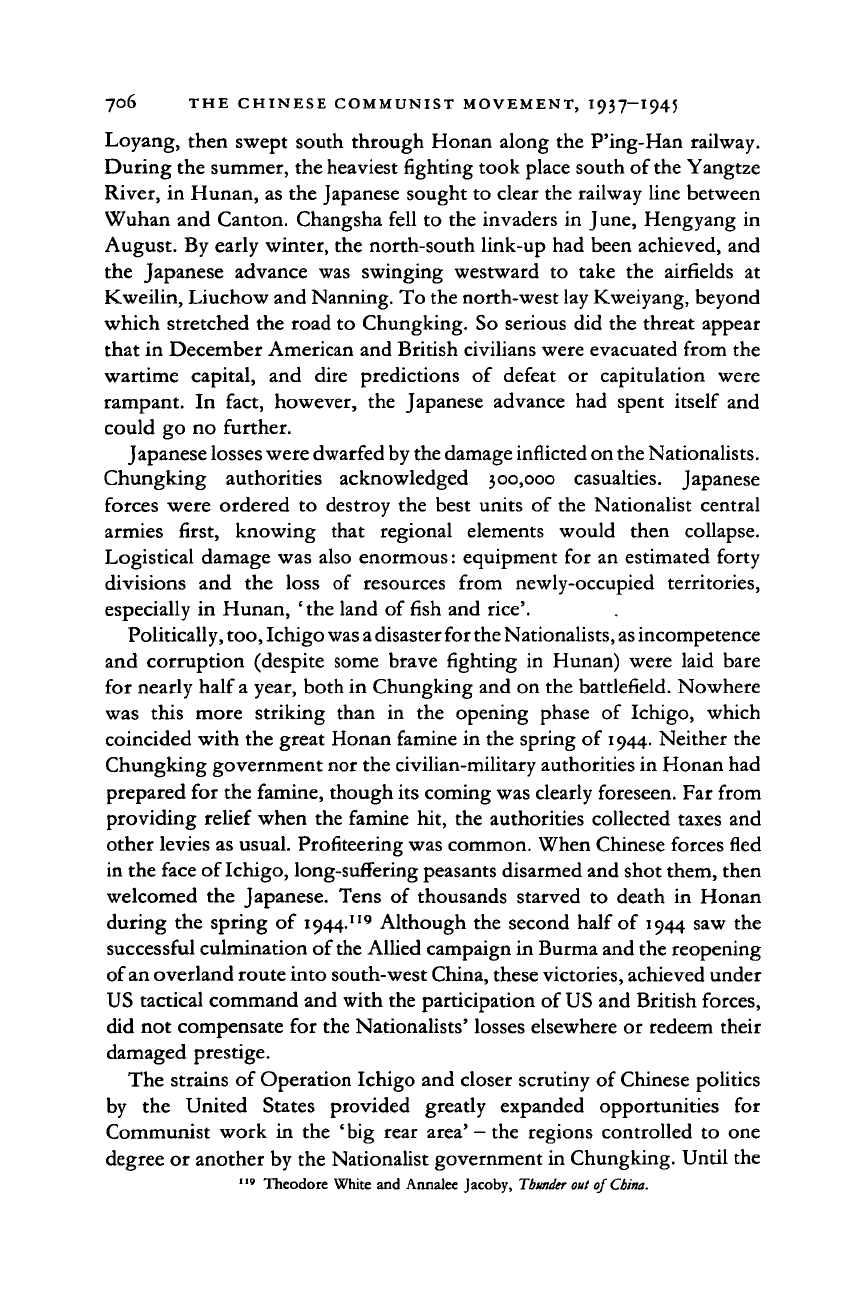
706 THE CHINESE COMMUNIST MOVEMENT, I937—1945
Loyang, then swept south through Honan along the P'ing-Han railway.
During the summer, the heaviest fighting took place south of
the
Yangtze
River, in Hunan, as the Japanese sought to clear the railway line between
Wuhan and Canton. Changsha fell to the invaders in June, Hengyang
in
August. By early winter, the north-south link-up had been achieved, and
the Japanese advance was swinging westward
to
take
the
airfields
at
Kweilin, Liuchow and Nanning. To the north-west lay Kweiyang, beyond
which stretched the road to Chungking. So serious did the threat appear
that in December American and British civilians were evacuated from the
wartime capital,
and
dire predictions
of
defeat
or
capitulation were
rampant.
In
fact, however,
the
Japanese advance
had
spent itself and
could go no further.
Japanese losses were dwarfed by the damage inflicted on the Nationalists.
Chungking authorities acknowledged 300,000 casualties. Japanese
forces were ordered
to
destroy the best units
of
the Nationalist central
armies first, knowing that regional elements would then collapse.
Logistical damage was also enormous: equipment for an estimated forty
divisions
and the
loss
of
resources from newly-occupied territories,
especially
in
Hunan, 'the land
of
fish and rice'.
Politically, too, Ichigo
was
a disaster for
the
Nationalists,
as
incompetence
and corruption (despite some brave fighting
in
Hunan) were laid bare
for nearly half
a
year, both in Chungking and on the battlefield. Nowhere
was this more striking than
in the
opening phase
of
Ichigo, which
coincided with the great Honan famine in the spring
of
1944. Neither the
Chungking government nor the civilian-military authorities in Honan had
prepared for the famine, though its coming was clearly foreseen. Far from
providing relief when the famine hit, the authorities collected taxes and
other levies as usual. Profiteering was common. When Chinese forces fled
in the face of Ichigo, long-suffering peasants disarmed and shot them, then
welcomed the Japanese. Tens
of
thousands starved
to
death
in
Honan
during the spring
of
1944.
119
Although the second half
of
1944 saw the
successful culmination of
the
Allied campaign in Burma and the reopening
of an overland route into south-west China, these victories, achieved under
US tactical command and with the participation of US and British forces,
did not compensate for the Nationalists' losses elsewhere or redeem their
damaged prestige.
The strains of Operation Ichigo and closer scrutiny of Chinese politics
by
the
United States provided greatly expanded opportunities
for
Communist work
in
the '
big
rear area'
—
the regions controlled
to
one
degree or another by the Nationalist government in Chungking. Until the
1
" Theodore White and Annalee Jacoby,
Thunder out
of
China.
Cambridge Histories Online © Cambridge University Press, 2008
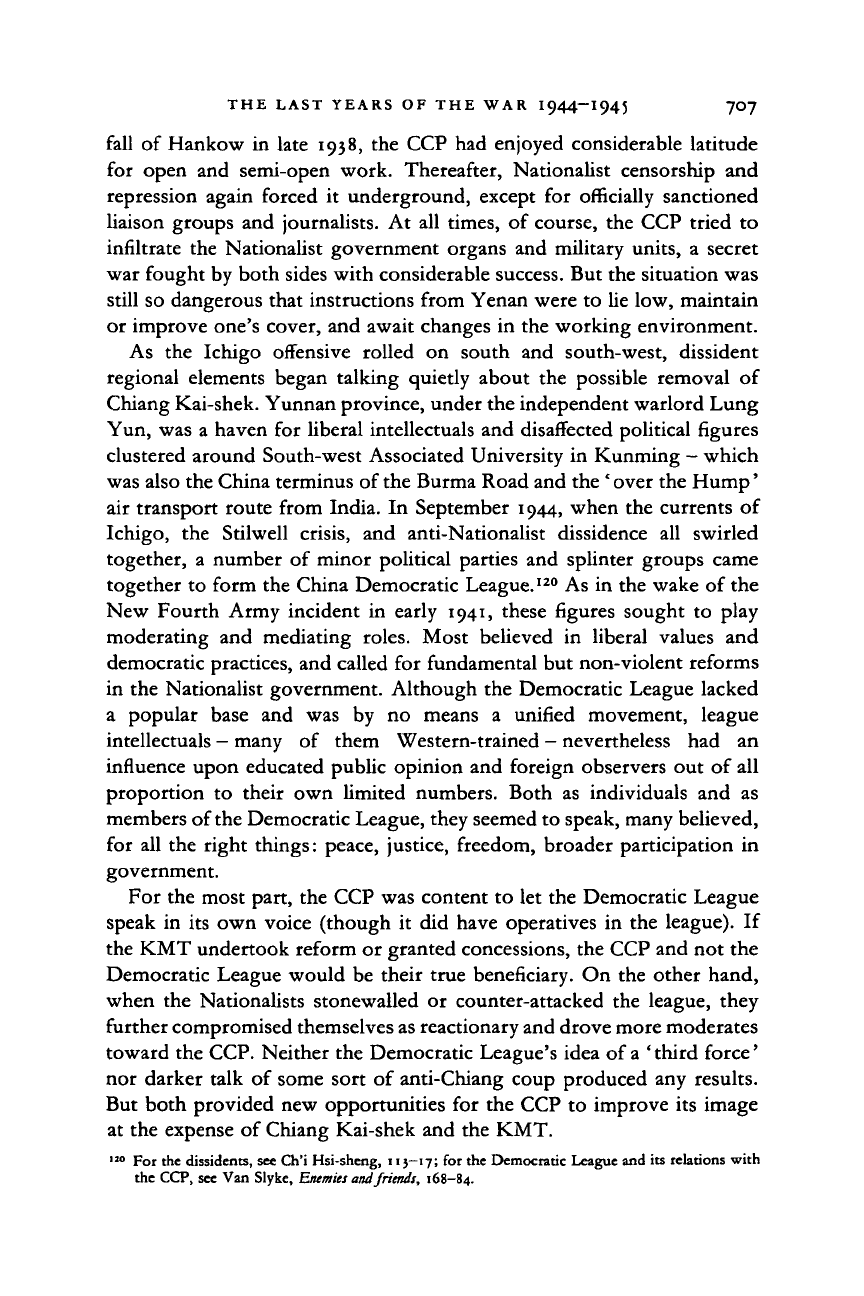
THE LAST YEARS OF THE WAR I944-I945 707
fall of Hankow in late 1938, the CCP had enjoyed considerable latitude
for open and semi-open work. Thereafter, Nationalist censorship and
repression again forced it underground, except for officially sanctioned
liaison groups and journalists. At all times, of course, the CCP tried to
infiltrate the Nationalist government organs and military units, a secret
war fought by both sides with considerable success. But the situation was
still so dangerous that instructions from Yenan were to lie low, maintain
or improve one's cover, and await changes in the working environment.
As the Ichigo offensive rolled on south and south-west, dissident
regional elements began talking quietly about the possible removal of
Chiang Kai-shek. Yunnan province, under the independent warlord Lung
Yun, was a haven for liberal intellectuals and disaffected political figures
clustered around South-west Associated University in Kunming - which
was also the China terminus of the Burma Road and the ' over the Hump'
air transport route from India. In September 1944, when the currents of
Ichigo, the Stilwell crisis, and anti-Nationalist dissidence all swirled
together, a number of minor political parties and splinter groups came
together to form the China Democratic League.
120
As in the wake of the
New Fourth Army incident in early 1941, these figures sought to play
moderating and mediating roles. Most believed in liberal values and
democratic practices, and called for fundamental but non-violent reforms
in the Nationalist government. Although the Democratic League lacked
a popular base and was by no means a unified movement, league
intellectuals - many of them Western-trained - nevertheless had an
influence upon educated public opinion and foreign observers out of all
proportion to their own limited numbers. Both as individuals and as
members of the Democratic League, they seemed to speak, many believed,
for all the right things: peace, justice, freedom, broader participation in
government.
For the most part, the CCP was content to let the Democratic League
speak in its own voice (though it did have operatives in the league). If
the KMT undertook reform or granted concessions, the CCP and not the
Democratic League would be their true beneficiary. On the other hand,
when the Nationalists stonewalled or counter-attacked the league, they
further compromised themselves as reactionary and drove more moderates
toward the CCP. Neither the Democratic League's idea of
a
' third force'
nor darker talk of some sort of anti-Chiang coup produced any results.
But both provided new opportunities for the CCP to improve its image
at the expense of Chiang Kai-shek and the KMT.
120
For the dissidents, see Ch'i Hsi-sheng, 113—17; for the Democratic League and its relations with
the CCP, see Van Slyke, Emmies and friends, 168-84.
Cambridge Histories Online © Cambridge University Press, 2008
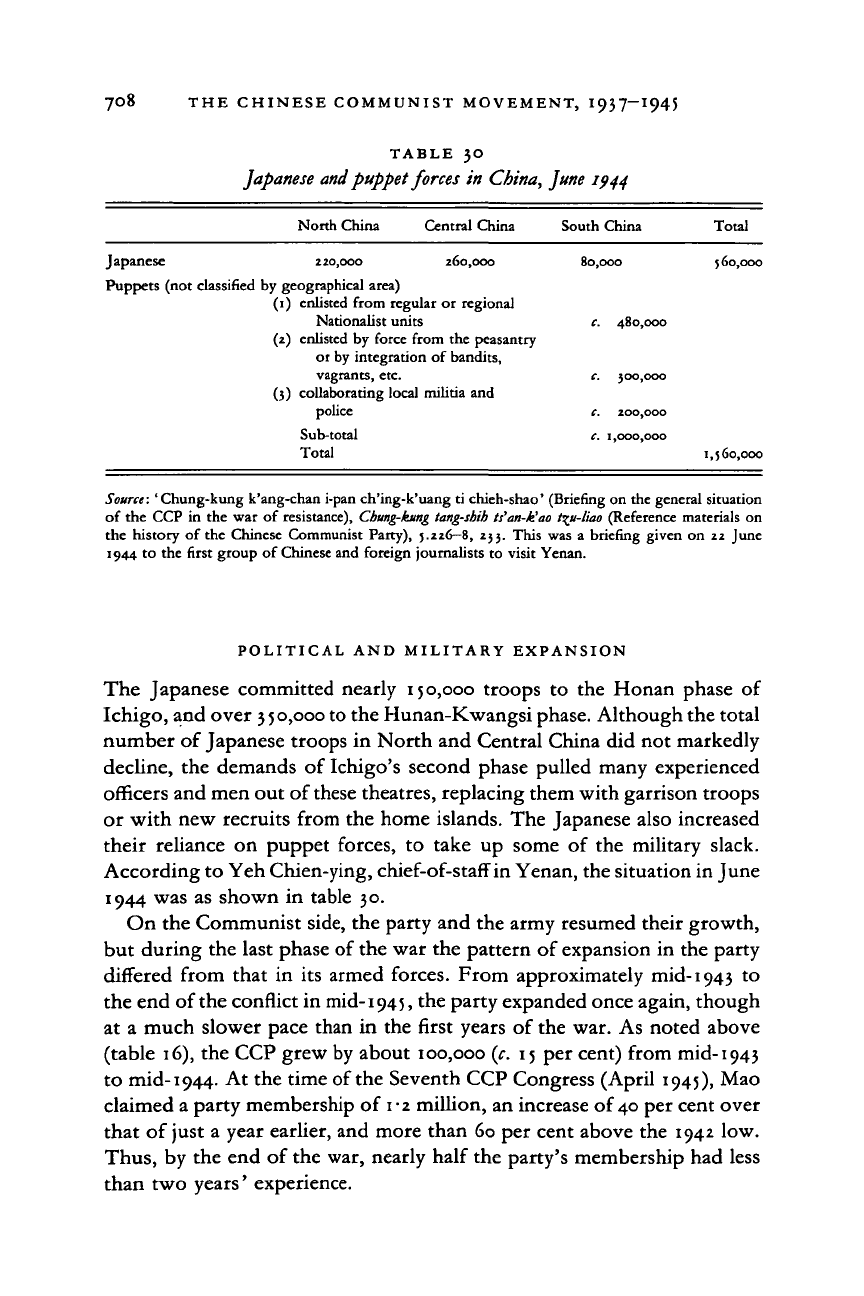
708 THE CHINESE COMMUNIST MOVEMENT, 1937-1945
TABLE 30
Japanese and puppet forces in China, June 1944
North China Central China
Japanese 220,000 260,000
Puppets (not classified by geographical area)
(1) enlisted from regular or regional
Nationalist units
(2) enlisted by force from the peasantry
or by integration
of
bandits,
vagrants, etc.
(3) collaborating local militia and
police
Sub-total
Total
South China
80,000
c. 480,000
c. 300,000
c. 200,000
c. 1,000,000
Total
560,000
1,560,000
Source:
'Chung-kung k'ang-chan
i-pan
ch'ing-k'uang ti chieh-shao' (Briefing on the general situation
of the CCP
in
the war
of
resistance),
Cbmg-kung tang-shih ts'an-k'ao tsyt-liao
(Reference materials on
the history
of
the Chinese Communist Party), 5.226—8, 233. This was
a
briefing given on 22 June
1944 to the first group
of
Chinese and foreign journalists to visit Yenan.
POLITICAL AND MILITARY EXPANSION
The Japanese committed nearly 150,000 troops
to
the Honan phase
of
Ichigo,
and over 3 50,000 to the Hunan-Kwangsi
phase.
Although the total
number of Japanese troops in North and Central China did not markedly
decline,
the demands of Ichigo's second phase pulled many experienced
officers and men out of these theatres, replacing them with garrison troops
or with new recruits from the home islands. The Japanese also increased
their reliance
on
puppet forces,
to
take
up
some
of
the military slack.
According to Yeh Chien-ying, chief-of-staff in Yenan, the situation in June
1944 was as shown in table 30.
On the Communist side, the party and the army resumed their growth,
but during the last phase of the war the pattern of expansion in the party
differed from that
in
its armed forces. From approximately mid-1943
to
the end of the conflict in mid-194
5,
the party expanded once again, though
at
a
much slower pace than in the first years of the war. As noted above
(table 16), the CCP grew by about 100,000
(c.
15 per cent) from mid-1943
to mid-1944. At the time of the Seventh CCP Congress (April 1945), Mao
claimed a party membership of 1-2 million, an increase of 40 per cent over
that of just
a
year earlier, and more than 60 per cent above the 1942 low.
Thus,
by the end of the war, nearly half the party's membership had less
than two years' experience.
Cambridge Histories Online © Cambridge University Press, 2008
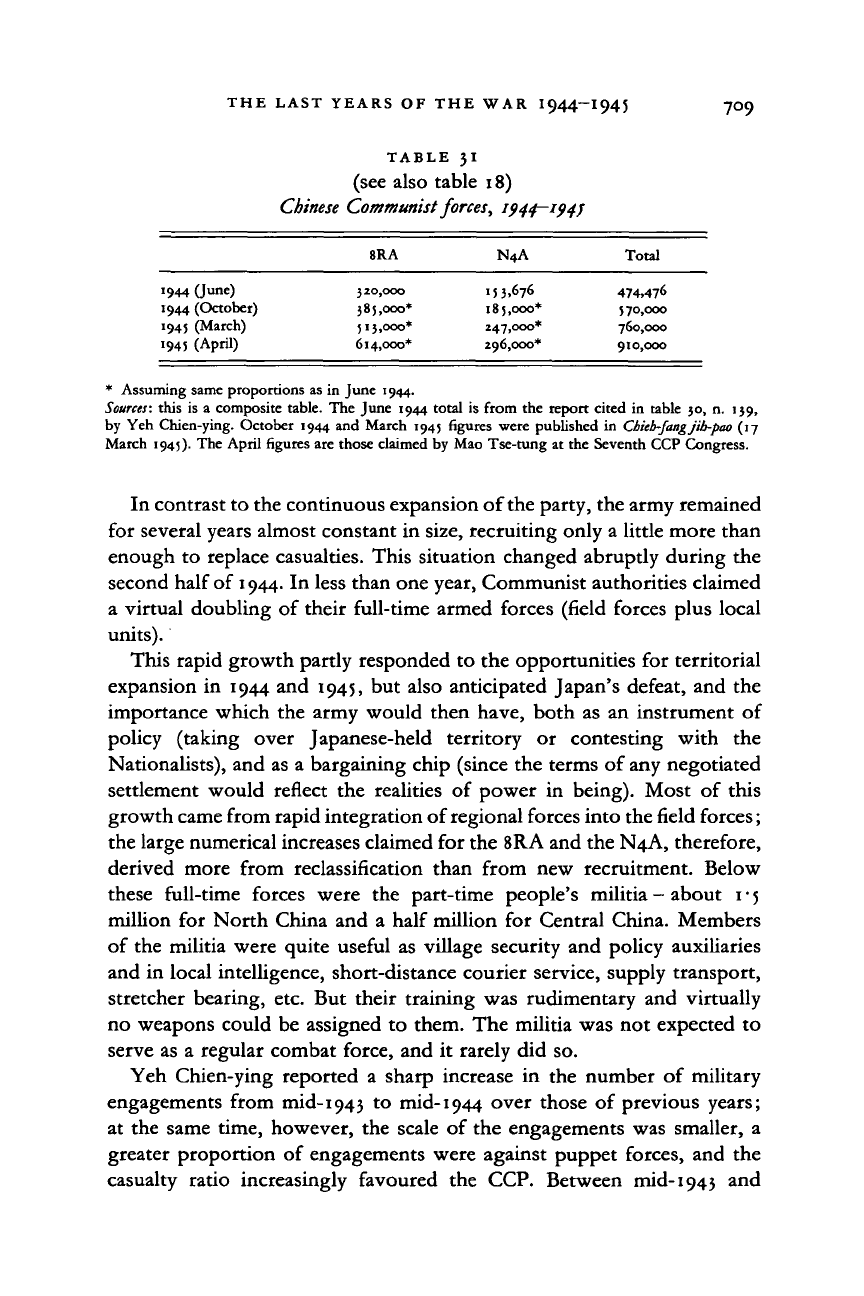
THE LAST YEARS OF THE WAR I944-I945 709
TABLE
31
(see also table 18)
Chinese
Communist forces,
8RA
N4A
Total
1944 (June) 320,000 153.676 474,476
1944 (October) 385,000* 185,000* 570,000
1945 (March) 513,000* 247,000* 760,000
1945 (April) 614,000* 296,000* 910,000
* Assuming same proportions as in June 1944.
Sources:
this
is a
composite table. The June 1944 total
is
from the report cited
in
table 30,
n.
139,
by Yeh Chien-ying. October 1944 and March 1945 figures were published
in
Cbieb-fang jib-poo (17
March 1945). The April figures are those claimed by Mao Tse-tung at the Seventh CCP Congress.
In contrast to the continuous expansion of the party, the army remained
for several years almost constant in size, recruiting only a little more than
enough
to
replace casualties. This situation changed abruptly during the
second half of
1944.
In less than one year, Communist authorities claimed
a virtual doubling
of
their full-time armed forces (field forces plus local
units).
This rapid growth partly responded to the opportunities for territorial
expansion in 1944 and 1945, but also anticipated Japan's defeat, and the
importance which the army would then have, both as an instrument
of
policy (taking over Japanese-held territory
or
contesting with
the
Nationalists), and as
a
bargaining chip (since the terms of any negotiated
settlement would reflect
the
realities
of
power
in
being). Most
of
this
growth came from rapid integration of regional forces into the field forces;
the large numerical increases claimed for the 8RA and the N4A, therefore,
derived more from reclassification than from new recruitment. Below
these full-time forces were
the
part-time people's militia
-
about
1 • 5
million
for
North China and
a
half million
for
Central China. Members
of the militia were quite useful as village security and policy auxiliaries
and in local intelligence, short-distance courier service, supply transport,
stretcher bearing, etc. But their training was rudimentary and virtually
no weapons could be assigned
to
them. The militia was not expected
to
serve as
a
regular combat force, and
it
rarely did so.
Yeh Chien-ying reported
a
sharp increase
in the
number
of
military
engagements from mid-1943
to
mid-1944 over those
of
previous years;
at the same time, however, the scale
of
the engagements was smaller,
a
greater proportion
of
engagements were against puppet forces, and the
casualty ratio increasingly favoured
the
CCP. Between mid-1943
and
Cambridge Histories Online © Cambridge University Press, 2008
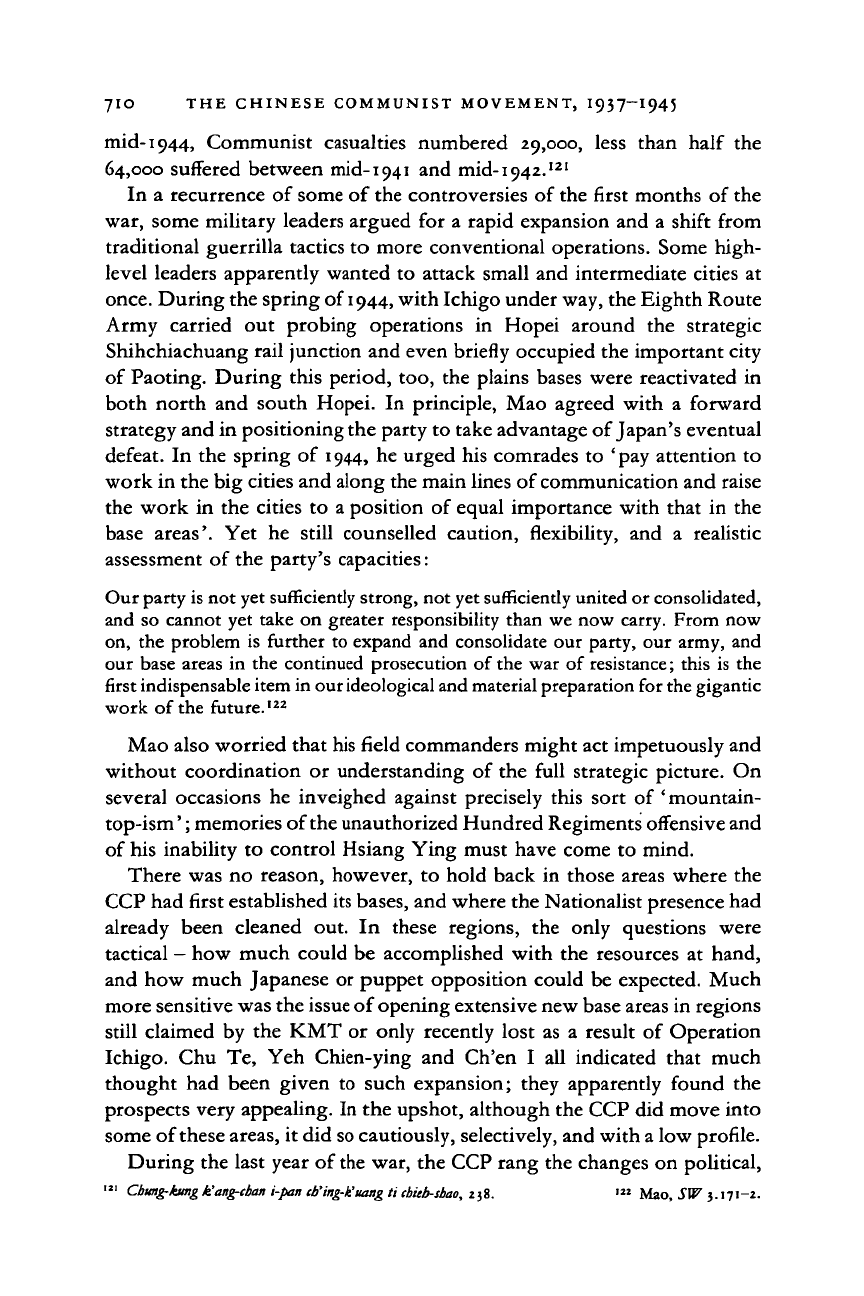
7IO THE CHINESE COMMUNIST MOVEMENT, I937-I945
mid-1944, Communist casualties numbered 29,000, less than half the
64,000 suffered between mid-1941 and mid-1942.
121
In
a
recurrence of some of the controversies of the first months of the
war, some military leaders argued for a rapid expansion and
a
shift from
traditional guerrilla tactics to more conventional operations. Some high-
level leaders apparently wanted to attack small and intermediate cities
at
once.
During the spring of
1944,
with Ichigo under way, the Eighth Route
Army carried
out
probing operations
in
Hopei around
the
strategic
Shihchiachuang rail junction and even briefly occupied the important city
of Paoting. During this period, too, the plains bases were reactivated in
both north and south Hopei.
In
principle, Mao agreed with
a
forward
strategy and in positioning the party to take advantage of Japan's eventual
defeat. In the spring
of
1944, he urged his comrades to 'pay attention
to
work in the big cities and along the main lines of communication and raise
the work in the cities to a position of equal importance with that
in
the
base areas'.
Yet he
still counselled caution, flexibility,
and a
realistic
assessment of the party's capacities:
Our party
is
not yet sufficiently strong, not yet sufficiently united or consolidated,
and so cannot yet take on greater responsibility than we now carry. From now
on, the problem is further to expand and consolidate our party, our army, and
our base areas in the continued prosecution of the war of resistance; this is the
first indispensable item in our ideological and material preparation for the gigantic
work of the future.
122
Mao also worried that his field commanders might act impetuously and
without coordination
or
understanding
of
the full strategic picture. On
several occasions he inveighed against precisely this sort
of
' mountain-
top-ism '; memories of the unauthorized Hundred Regiments offensive and
of his inability to control Hsiang Ying must have come to mind.
There was no reason, however, to hold back in those areas where the
CCP had first established its bases, and where the Nationalist presence had
already been cleaned out.
In
these regions,
the
only questions were
tactical
—
how much could be accomplished with the resources
at
hand,
and how much Japanese or puppet opposition could be expected. Much
more sensitive was the issue of opening extensive new base areas in regions
still claimed by the KMT or only recently lost as
a
result
of
Operation
Ichigo. Chu Te, Yeh Chien-ying and Ch'en
I all
indicated that much
thought had been given
to
such expansion; they apparently found the
prospects very appealing. In the upshot, although the CCP did move into
some of these areas, it did
so
cautiously, selectively, and with a low profile.
During the last year of the war, the CCP rang the changes on political,
121
Cbung-kmgk'ang-cbani-pancb'ing-k'mngticbUb-sbao,!^.
•«
Mao, SW 3.171-2.
Cambridge Histories Online © Cambridge University Press, 2008
